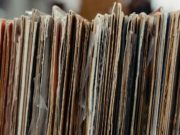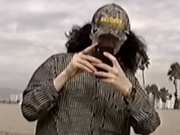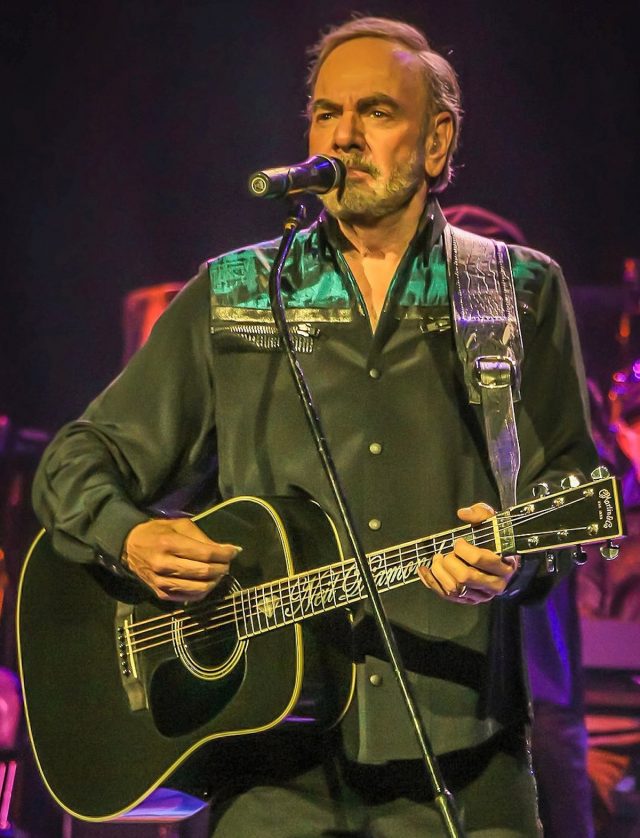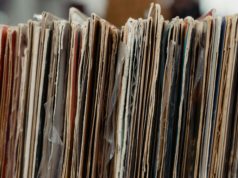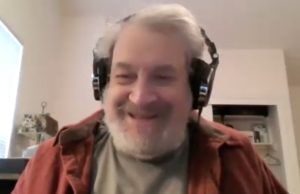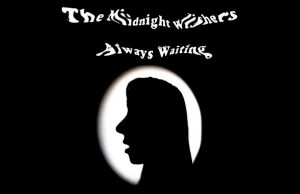I just noticed that today is Neil Diamond’s birthday. That reminded me that I was lucky enough to speak to the legendary singer-songwriter back in 2010, when he was just about to release his covers album Dreams. As always, a bunch of our chat had to be cut for the limited space of print. But I’ve restored it here. Enjoy:
Neil Diamond is living the dream.
“To write the music that I feel, and to be as honest as I possibly can be in that music, and to hopefully have people share the experience of that music — that has always been my dream,” explains the singer-songwriter, his instantly recognizable baritone rumbling down the line from his New York City home. “My dream is already being fulfilled and I’m going to take full advantage of it as long as I’m around.”
But for his latest album, the self-professed “Jewish Elvis” is taking advantage of a few other songwriters’ output. The aptly titled Dreams is a collection of ’60s and ’70s covers, from classics like The Beatles’ Yesterday and Leonard Cohen’s Hallelujah to lesser-known gems from Harry Nilsson and Randy Newman. His own early hit I’m a Believer is also included in the set, which exchanges the pop and rock settings of the originals for mellow, lightly orchestrated backdrops. “I haven’t given a name to the style,” he says, “but it does seem like the arrangements are very natural and unforced and right.”
With the album in stores and online this week, the 69-year-old tunesmith weighed in on cover tunes, his Rock and Roll Hall of Fame nomination and whether he is or isn’t cool. Here’s how it went:
Last I heard, you were working on a third album of originals with producer Rick Rubin. Where did this come from?
This album really was accidental. I started recording in my studio a little more than a year ago. Just to sing. Just for the sheer joy of singing. I didn’t have any songs of my own. So I just started singing my favourite songs from the past. I would record them with maybe just a guitar and put them away. And the next week, I would come in for a day and do the same thing. Just to keep my mind focused and to lift me up and to keep me in touch with music. After a number of months, I realized I had begun recording a collection of songs that were meaningful to me, and had left an impression upon my over my lifetime, particularly from the ’60s and ’70s. They all felt real and natural and good. I chose some and played them for the people at Columbia Records just as a curiosity, and they loved what they heard and wanted me to continue. Which is what I did. And I ended up with the Dreams album.
What made you choose these songs? Aside from their vintage, is there something they all have in common?
They do strike some kind of magical chord with me. It’s kind of hard to define, but it’s a chemistry, maybe. A lot of people have responded to these songs in the same way. It’s more than words, it’s more than music, although the words and music to these songs are wonderful. But there’s some other third element that was touched on that brought them to my mind and made me want to sing them. That and my desire to represent the songs in a way that was organic and natural. But mostly it was the magic inherent in each of them.
Most of the songs are from the ’60s and ’70s. Is there something about the music of that era that speaks to you more than other eras? Is there no one writing at that level today?
Well, I don’t know about whether there’s someone writing at that level today. But I do know that these songs left a very deep impression on me. It was a very impressionable time of my life, and in my career. I was on the verge and still knocking around the streets and knocking on doors at the early part of the ’60s. And as that decade progressed, history was made musically by the advent of Bob Dylan, the entrance on the scene of The Beatles and the British groups that came. And the whole change in the thought processes of people in the music world, where suddenly the songwriter came to the fore and became an important element in the music business. This was not true before that. There were singers and there were songwriters and very rarely did the two come together. So it was a very fertile era for me as a songwriter and as a person who wanted to sing. I really started to sing out of sheer desperation because I couldnn’t get anybody else to sing my songs. And I hadn’t yet really found my voice in my own music until I started recording them myself. So it was all a very exciting time for me and it left a very deep impression. And these songs were part of that time and that era. So they left a very deep impression on me as well.
Some have been covered so many times, like Hallelujah and Yesterday. How do you approach a song that’s been done by everyone and their dog?
Well, yes, maybe everyone has done these songs before. But I haven’t. So they were all new to me. I’ve heard them before, of course. But not coming out of my mouth. That’s the only thing I can add that’s new to the scenery.
You mentioned not having any of your own songs at the time you started this album. Did delving into others’ songs spark your own creativity?
I wouldn’t be surprised. But I don’t really need external forces or influences to get me excited about writing. It’s what I do. It’s part of my whole makeup. So I write whether I’m inspired by something or not.
So where does that third Rick Rubin album stand now?
Well, when the dust settles with this album, I’m going to look at the material I have. And I’ll probably sit down with Rick and see what his feelings are and see whether we move ahead on the material I have. It’s all determined by the songs, the material. That will determine what happens next.
How do you feel about being nominated for the Rock and Roll Hall of Fame? What are your chances?
I think it’s great to be recognized, even with a nomination. I’m not even thinking about whether I’m going to get in. I’m really just enjoying this moment, and I’m going to take it as it comes.
If you did get in, who would you want to induct you?
I’d like Elvis Presley, but he’s not available. (Laughs)
You only have one Grammy, and it was for the Jonathan Livingston Seagull soundtrack in the ’70s. Have you felt snubbed? Shouldn’t you have a shelf of Grammys?
I have something else: An unbelievably loyal and devoted audience. And I have had a life in music that’s ongoing. So I’ll have to make do with that. (Laughs) It’s more than fair.
Speaking about your life in music, you’re turning 70 in January. Do you plan to change your touring schedule and workload?
I won’t change what I’m doing. I like the tempo of my life and my career. And I don’t expect to make any changes or back down because of numbers. As long as I feel good and I am healthy, which I am, I’m going to continue and let the chips fall where they may. The fact I’m maturing only makes me more excited about my future work because I know there’s only a limited time. But I look forward to the future as a way to expand the work that I do and to find new and exciting ways to express myself musically.
There’s a lot of debate about how cool you are or aren’t. Have you ever cared?
I never really thought about it. My kids think I’m pretty cool, so I’ll just leave it at that.
So many people have covered your songs. Any favourites?
Sinatra’s version of Sweet Caroline is up there. And I love UB40’s version of Red Red Wine, which was a complete surprise. There are a few over the years that are surprising and wonderful. You just never know where they come from. I hope a few more come along.






